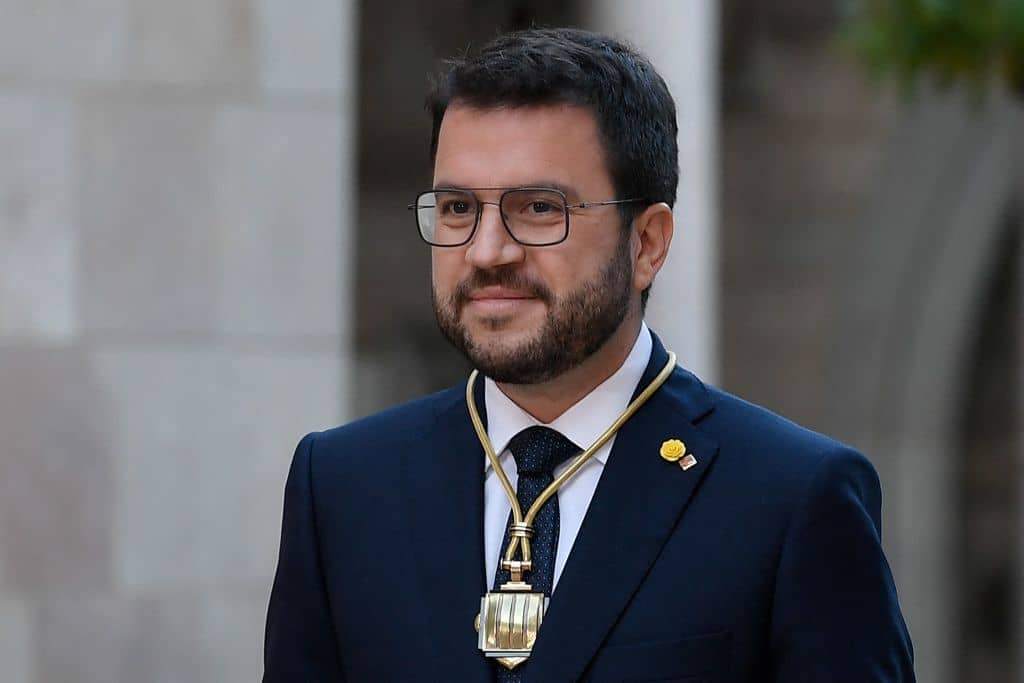Catalonia’s president Pere Aragones has wanted to win independence from Madrid ever since since joining the Republican Left of Catalonia (ERC) as a teenager. Despite the obstacles standing in his way, he now seeks inspiration from two votes held in the UK: the Scottish independence referendum and Brexit.
Aragones resumed negotiations with Spain’s socialist prime minister Pedro Sanchez last month, almost five years after an illegal referendum on Catalan secession triggered a constitutional crisis. But despite Madrid’s willingness to talk, he faces a Spanish establishment that is as pro-union now as it was in 2017.
Two apparently immovable obstacles stand in the way of those seeking to secure an independent Catalonia: the 1978 Spanish constitution, with its commitment to the ‘indissoluble unity of Spain’, and a prime minister fundamentally opposed to a referendum. But Aragones isn’t deterred: the 39 year-old tells me there are multiple routes to a legal referendum, if only the Spanish establishment shared what he calls the ‘political will’ of the Catalan government. It’s here that he has Scotland in mind.
‘(One) way,’ he tells me, ‘is to transfer power to organise a specific referendum, temporarily or permanently, from the Spanish government to the Catalan government, as in the Scottish independence referendum.’
‘The best example of that is Brexit,’ he says
Aragones is referring to the Edinburgh Agreement, by which David Cameron temporarily handed over authority from Westminster to the Scottish government led by Alex Salmond, thus enabling Scotland to vote on independence in September 2014.
The complexities that would follow if Catalans opted to split from the rest of Spain, insists Aragones, could be ironed out afterwards. Here he points to another of the UK’s most divisive political dramas: Britain’s departure from the EU.
‘The best example of that (what to do after independence) is Brexit. After the referendum, there were negotiations with the EU to manage the consequences and finally to present the result of the referendum,’ he says.
There are also other mechanisms that could be used to legitimise a vote on Catalan independence, according to Aragones. He cites Spain’s Referendum Act of 1980, which allows referendums to be held anywhere in Spain, providing they are requested by the monarch and approved by parliament.
‘If there is an agreement between the Spanish and Catalan governments, then I am absolutely convinced that we will find a way to organise a referendum’, he says.
Catalonia’s last independence referendum was anything but state approved. The chaotic vote took place on 1 October 2017, despite being declared illegal in advance by Spain’s constitutional court: of the 43 per cent of Catalans who participated in the vote, 92 per cent voted for independence. Then president Carles Puigdemont bolted to Belgium immediately afterwards, where he remains in exile, but twelve of his colleagues were imprisoned.
Spain’s supreme court handed down prison sentences of between nine and 13 years to separatists, having found them guilty of disobedience, misuse of public funds and sedition; all were acquitted of the more serious offence of rebellion, which can carry a sentence of 30 years. But in June 2021, after almost four years behind bars, they were pardoned by Sanchez and released from prison. All nine of these politicians and activists, however, are still subject to lengthy bans from politics. Aragones says the pardons are welcome but insufficient.
‘The (Spanish) government thinks it has made a very important step,’ he says, ‘but the pardons are not complete…The idea that I talked about with Sanchez (during the meeting on 15 July) was: ‘OK, you’ve released the leaders from jail, now the risk is that people who were part of their teams can also go to jail’’.
The president is referring to dozens of Catalans still awaiting trial for their involvement in the botched bid to secure independence. Ten mayors and 50 senior civil servants are among those awaiting their turn in the dock, according to the Catalan NGO Omnium. Yet if the referendum’s orchestrators have already been released, why are other officials charged with the same offences still facing jail time? It’s a legitimate question especially when their alleged crimes consisted solely in expressing their political views, as the Catalan government maintains.
The Spanish judiciary, executive and monarchy see things differently. As separatists protested throughout Barcelona in the days after the supreme court verdicts were announced, King Felipe VI condemned the 2017 Catalan referendum in a rare televised address, charging Puigdemont with ‘irresponsible conduct (which) could even jeopardise the economic and social stability of Catalonia and all of Spain.’ Sanchez said the sentences were ‘the conclusion of an exemplary legal process’.
For Aragones, though, the Supreme Court’s interpretation of sedition is too broad: as defined in Spain’s penal code, it requires a ‘public and tumultuous uprising’ and the prevention, ‘by force or outside of legal means, of the application of the law”. His point is that if sedition applies to the events of 2017, then it could also be affect all peaceful demonstrations, which violate the right to free assembly. In a report issued last June, the Council of Europe’s Parliamentary Assembly recommended that Spain reform this aspect of its legal system and that anyone still under investigation for their role in the referendum be pardoned. Aragones describes this report as his ‘guide’ in the talks with Spain’s PM.
Over 20 years since joining the ERC, Aragones’ political convictions are unchanged: ‘The best way to achieve an equal and prosperous society in Catalonia is that (it) becomes an independent state.’ He is unfazed by the obstacles and even undeterred by the prospect of a prison cell. ‘The most important goals of both personal and political life are always very complicated’, he says, smiling.






Comments